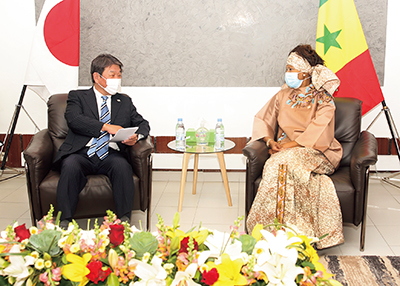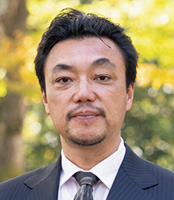Diplomatic Bluebook 2021
Chapter 2
Japan's Foreign Policy by Region
5 West Africa
(1) Ghana
The administration of President Nana Addo Dankwa Akufo-Addo has adopted the vision of “Ghana Beyond Aid,” and has been working to attract investment and diversify industry since he assumed the presidency in 2017. Since the spread of COVID-19, the administration has been focusing on measures to fight COVID-19 and rebuilding the domestic economy. President Akufo-Addo, New Patriotic Party (NPP), was re-elected in the presidential election held on December 7.
Japan has supported the Noguchi Memorial Institute for Medical Research for many years through ODA. The institute, a symbol of friendship between the two countries, was responsible for up to about 80% of the country's PCR tests. It has played a central role as a core facility for measures against COVID-19.
(2) Guinea
In Guinea, which has fertile soil and abundant mineral resources, President Alpha Condé has initiated socio-economic development efforts. On the domestic affairs front, national assembly elections and a referendum on constitutional amendments was held in March. In October, a presidential election was held based on the new constitution, and President Condé was inaugurated in December.
Japan has friendly relations with Guinea, and President Condé has visited Japan three times since he took office (2013, 2017 and 2019). There have also been exchanges at the grassroots level, such as exchanges through traditional drums (djembe).
(3) Guinea-Bissau
Guinea-Bissau aims to escape poverty and political instability by taking advantage of its fertile lands, fishery resources and mineral resources. It held presidential elections in November 2019 and January 2020, where candidate Umaro Sissoco Embaló was elected as the new president.
Japan is providing support to Guinea-Bissau mainly in basic human needs, contributing to the alleviation of poverty. At the time of the presidential election, Japan provided election-related materials and equipment in cooperation with the UNDP.
(4) Côte d'Ivoire
Côte d'Ivoire, a major country in West Africa, held a presidential election in October, re-electing President Alassane Ouattara. President Ouattara is making efforts to strengthen the foundation for the further development of the country with measures such as advancing reconciliation between the ruling and opposition parties.
Japan has friendly relations with Côte d'Ivoire, and in 2020, the two countries celebrated the 60th anniversary of the establishment of diplomatic relations. Both countries signed the Japan-Côte d'Ivoire Investment Agreement in January, which is expected to promote bilateral business relations in the future.
(5) Senegal
In February, the Public and Private Sector Joint Mission for Promoting Trade and Investment in Africa headed by Parliamentary Vice-Minister for Foreign Affairs Nakatani was dispatched from Japan to Senegal in which 20 Japanese companies participated. President Macky Sall expressed Senegal's expectations for further investment by Japanese companies. In addition, the first meeting of the Japan-Senegal Economic Committee, established by the Seventh Tokyo International Conference on African Development (TICAD7) in August 2019, was held in conjunction with the dispatch of the Mission.
In 2020, Japan and Senegal celebrated the 60th anniversary of the establishment of diplomatic relations and the 40th anniversary of the dispatch of Japan Overseas Cooperation Volunteers of the Japan International Cooperation Agency (JICA) to Senegal, and commemorative events were held in both countries. In October, the Foreign Minister and Economic Minister from the Government of Senegal attended a commemorative reception hosted by the Embassy of Japan in Dakar. In November, State Minister for Foreign Affairs Washio Eiichiro attended a commemorative ceremony in Tokyo hosted by the Senegalese Embassy in Japan.
In January 2021, Foreign Minister Motegi visited Senegal to pay a courtesy call to President Sall and also hold two foreign ministerial meetings with Minister for Foreign Affairs Aïssata Tall Sall. Through Foreign Minister Motegi's visit, the two countries agreed to enhance multilayered relations of cooperation based on long-standing friendly relations.
 Japan-Senegal Foreign Ministers' Meeting
Japan-Senegal Foreign Ministers' Meeting(January 11, 2021, Dakar, Senegal)
(6) Togo
Under the strong leadership of President Faure Essozimna Gnassingbé, who won his fourth election in the February presidential election, Togo is actively working on democratization, improving people's lives, and stabilizing the West African region. Prime Minister Victoire Tomegah-Dogbé was appointed in September, and a new cabinet was formed in October.
Japan has friendly relations with Togo, and in 2020, the two countries celebrated the 60th anniversary of the establishment of diplomatic relations. President Gnassingbé is known to have great affinity toward Japan, having visited the areas affected by the Great East Japan Earthquake twice. In September, a mutual cooperation agreement was signed between Hyuga City (Miyazaki Prefecture), the Embassy of the Republic of Togo in Japan, and the Japan-Togo Friendship Association.
(7) Nigeria
President Muhammadu Buhari, re-elected in the 2019 presidential election, is prioritizing efforts on the three pillars of economy, security and anti-corruption. On the security front, in particular, Nigeria is cooperating with neighboring countries to deal with the problem of terrorism in the northeastern region by Boko Haram and Islamic State (IS) West Africa Province (ISWAP).
In 2020, Japan and Nigeria celebrated the 60th anniversary of the establishment of diplomatic relations. Japan is providing support to the Nigeria Centre for Disease Control (NCDC), which plays an important role in fighting COVID-19 in Nigeria. Many Japanese companies are also interested in Nigeria's high economic potential. As such, in January 2021, Foreign Minister Motegi held a telephone call with Foreign Minister Geoffrey Onyeama in which they shared the view to promote cooperation, including on the fight against COVID-19, development challenges, and business relations.
(8) Niger
In Niger, the first round of presidential elections was peacefully held in December, and the top two candidates advanced to the final round next year.
Japan has friendly relations with Niger, and in 2020, the two countries celebrated the 60th anniversary of the establishment of diplomatic relations. In September, Japan provided emergency relief goods, such as tents and water purifiers, after the country was hit by large-scale flooding nationwide.
(9) Burkina Faso
The political situation in Burkina Faso has been relatively stable since President Roch Kaboré took office in 2015. On the other hand, there have been a number of terrorist incidents in recent years, and the country is facing deteriorating public security. President Kaboré was re-elected in the November presidential election, announcing that improving security would be a priority. The election was held peacefully, demonstrating that democracy has progressed in the country.
Japan has friendly relations with Burkina Faso, and in 2020, the two countries celebrated the 60th anniversary of the establishment of diplomatic relations. In March and August, Japan provided Emergency Grant Aid in response to the rise in internally displaced persons in the country.
(10) Mali
In Mali, a coup by a group of Malian army soldiers in August forced President Ibrahim Boubacar Keita to resign, and rebel leader Assimi Goita seized power. After discussions with mediators from the Economic Community of West African States (ECOWAS), interim President Bah N'Daw took office in September, and an interim cabinet led by interim Prime Minister Moctar Ouane was inaugurated in October. The interim government is preparing to hold presidential and national assembly elections within 18 months. In Mali, the United Nations Multidimensional Integrated Stabilization Mission in Mali (MINUSMA), the French military forces, and others have been deployed and are working to maintain peace and combat terrorism.
Japan has friendly relations with Mali, and in 2020, the two countries celebrated the 60th anniversary of the establishment of diplomatic relations. Japan is supporting efforts to improve security in Mali by providing security equipment and supporting the United Nations Peacekeeping Operations (PKO) training center.
(11) Mauritania
Mauritania has a stable government under President Mohamed Ould Cheikh El Ghazouani, who took office in August 2019. The country attaches great importance to efforts for peace and stability in the Sahel region and chaired the G5 Sahel1 in 2020. On the economic front, Mauritania's economy is based on exporting abundant marine, mineral and energy resources. In recent years, expectations have increased for developing offshore oil and gas resources.
Japan has friendly relations with Mauritania, particularly with respect to marine resources. In 2020, the two countries celebrated the 60th anniversary of the establishment of diplomatic relations. Japan is supporting Mauritania in its efforts toward food security through food assistance, in addition to support for capacity building in fisheries.
- 1 Framework for cooperation on security, development and governance by the five Sahel countries (Burkina Faso, Chad, Mali, Mauritania, and Niger)

1960 is known as the “Year of Africa,” when 17 countries on the African continent gained independence. For Japan, whose top priorities at the time were the postwar process and the securing of its position as a member of the West, it would not be an exaggeration to say that systematic diplomacy with Africa did not even exist.
This situation began to change around the first half of the 1970s. The signing of the Treaty on Basic Relations between Japan and the Republic of Korea (ROK) in 1965 and the normalization of diplomatic relations between Japan and China in 1972 signaled certain prospects for progress in the postwar process. In addition, due to the first oil crisis that struck in 1973, the Government of Japan began to position Africa as an oil supplier. Furthermore, there were also stronger views that relations with countries of Africa should be strengthened as they could offer their voting support at the United Nations. Against this backdrop, then-Foreign Minister Kimura Toshio became the first Foreign Minister of Japan to make a round of visits to five African countries from October to November 1974. For the first time, Japan turned its gaze on Africa, which had been virtually outside of Japan's field of vision until then. We can say that Japan's diplomacy with Africa began to derive some “benefits” from the strengthening of its relations with Africa.
A significant turning point in Japan's Africa policy came during the end of the Cold War, from the second half of the 1980s to the early 1990s. Amidst the turbulent changes to the global structure, the Ministry of Foreign Affairs increasingly leaned toward the position that instead of the “passive diplomacy” that it had previously practiced as a country defeated in the war, Japan should practice “proactive diplomacy” and be actively involved in the establishment of the world order. This point of view was embodied in the Tokyo International Conference on African Development (TICAD) process, which began in 1993. The inaugural conference, TICADI, did not focus on the perspective of “how to help Africa,” but instead placed the emphasis on “the sharing of the principles of development by the international community with countries of Africa,” and Japan sought to take the lead in these discussions. For more than a decade after that, Japan's diplomacy with Africa focused on values and principles, such as the approach to development and human security.
Japan's diplomacy with Africa, which developed in this way, began to reflect the new circumstances of rapid economic growth among African countries at the start of the 21st century, and shifted toward an emphasis on promoting private investment. As the focus for African development funding changed from aid to investment, the pillars of Japan's diplomacy with Africa in recent years have moved toward attracting Japanese corporations to the African business world and generating profit for both Japan and the countries of Africa.
The year 2020 marked the 60th year since the “Year of Africa.” As Japan's diplomacy with Africa developed with a strong commitment to profit, the world was struck by the novel coronavirus disease (COVID-19) pandemic. The COVID-19 pandemic has highlighted how human society cannot be sustained through the pursuit of profit through economic growth alone, and reaffirmed the importance of addressing issues such as disparity and poverty. As we approach TICAD8, which will be held in Tunisia in 2022, it is hoped that Japan will pursue both profit and values in its diplomacy with Africa.

